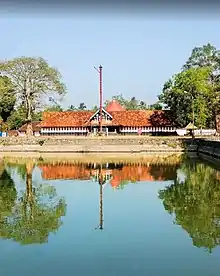Tirunettur Mahadeva Temple
Tirunettur Mahadeva Temple is located at Vyttila village in Ernakulam district. The temple has two main deities, Sri Parameswara and Maha Vishnu. Deities having separate temple complex; Lord Sri Parameswara in the form of Sri Rudra and Maha Vishnu in the form of Vaikundeswara. Both deities are facing east. It is believed that Shiva temple is one of the 108 Shiva temples of Kerala and is installed by sage Parasurama dedicated to Lord Shiva.[1][2][3]
| Tirunettur Mahadeva Temple | |
|---|---|
 Mahadeva Temple facing to Temple pond | |
| Religion | |
| Affiliation | Hinduism |
| District | Ernakulam |
| Deity | Lord Shiva Maha Vishnu |
| Festivals | Maha Shivaratri, Ashtamirohini, Karkkidaka Vavu |
| Location | |
| Location | Vyttila |
| State | Kerala |
| Country | |
| Geographic coordinates | 9.9283367°N 76.3103607°E |
| Architecture | |
| Type | Kerala style |
| Completed | Not known |
| Monument(s) | 2 |
It is believed that Vilwamangalam Swamiyar visited Thiru Nettur Shiva Temple and he had suggested the construction of the temple of Vishnu idol. Apart from the temples of Lord Shiva and Lord Vishnu; there is Sri Krishna temple. Deities in the Thirunettur temple include Ganapathy, Krishnan, Subramanya, Saraswati, Yogiswaran and Pamban Devan.
Vavu Bali Offer
Many people visit Maha Vishnu temple to offer their ancestors on Amavasya day of the Malayalam month of Karkkidakam.[4] The temple is famous for "karkidaka vavu "; on the day of Amavasya, devotees visit the temple for paying respect to their ancestors and offer "bali".[5]
Temple Structure
The temple compound is 5.5 acres; Sri Mahadeva (Lord Shiva) and Lord Vishnu have been built in a separate temple complex. The four sides of the circumference of the Siva temple have been completed and the Nalambalam of Vishnu temple is halved. The temple complex (Nalambalam, Sanctum Santorium) and the lighthouse are built in the Kerala style of architecture. Likewise, the prayer hall and the bellikkal pura are beautiful.
Festival of Temple
The Kodiyattu festival in the temple is celebrated in Dhanu, lasting for eight days and ending with arattu (holy bath) on Thiruvathira day. Since both the temples have flag masts, the festival is common. Shivarathri and Ashtami Rohini are also celebrated with great pomp and flavour.
See also
Temple Photos
- Thiru Nettur Temple
 MahaDeva Temple
MahaDeva Temple Temple Pond and Mahadeva Temple
Temple Pond and Mahadeva Temple ThiruNettur Temple Nalambalam
ThiruNettur Temple Nalambalam Nalambalam (Mahadeva Temple)
Nalambalam (Mahadeva Temple) Long View of Temple
Long View of Temple
References
- Kunjikuttan Ilayath. 108 Siva Kshetrangal. H and C Books.
- "108 Shiva Temples created by Lord Parasurama in Kerala – Sanskriti - Hinduism and Indian Culture Website". 3 March 2018.
- "108 Shivalaya Nama Stotram - 108 Shivalaya Nama Stothra – Temples In India Information". templesinindiainfo.com. 9 July 2017.
- "Temples all set for Vavu Bali".
- http://epaper.timesofindia.com/Repository/getFiles.asp?Style=OliveXLib:LowLevelEntityToPrint_TOINEW&Type=text/html&Locale=english-skin-custom&Path=TOIKRKO/2012/07/19&ID=Ar00205